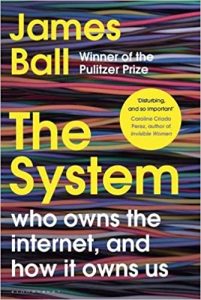James Ball’s The System: who owns the internet and how it owns us is pretty sobering reading, not least as 2020 has turned online access into even more of a necessity than it already was. (Though I can’t be the only person in despair at the prospect of yet another Zoom/Teams/Hangout etc, & mystified as to why some people are so sure we’ll all want to stick with working from home forever now. )
Anyway, the book. It’s a nice overview of all of the dysfunctions of the modern internet – corporate and state surveillance, monopolies, hackers and fraud, and the belated beginning of tougher regulation. It’s particularly good at explaining enough of the origins and technologies to make it clear how things have turned out the way they have. For instance, the reminder that key innovations were funded by the US government so none of the pioneers thought about business models – in contrast to the older communications networks, where billing was an important engineering requirement. A fateful oversight. For hence the toxic reliance on advertising – and there’s a great chapter on this – with its constant need to get people to click.
This book is far, far better on the potential for, and drivers of, surveillance than the over-rated rhetorical doorstop of Shoshana Zuboff’s Surveillance Capitalism book. I also really enjoyed learning from The System about some new things about the physical internet infrastructure – the Border Gateway Protocol was new to me – how packets make their way through the physical network. It’s frankly terrifying, the reliance on a short-term fix that started life scribbled on a couple of napkins decades ago and hasn’t changed too much since.
All in all, although some of the material is fairly familiar now, a very well-informed book and also really well written. For me, worth it for the chapter on advertising alone, which explains the origins of the online ad market and horrifying extent of the tracking targeted ads requires. We have a systemic Faustian pact – great free services in exchange for our souls. If I were in charge of regulating the online world, advertising and the business models would be my number one target. Regulators are supposed to be agnostic about business models – but there needs to be a mixed economy of models for that rule to apply.

